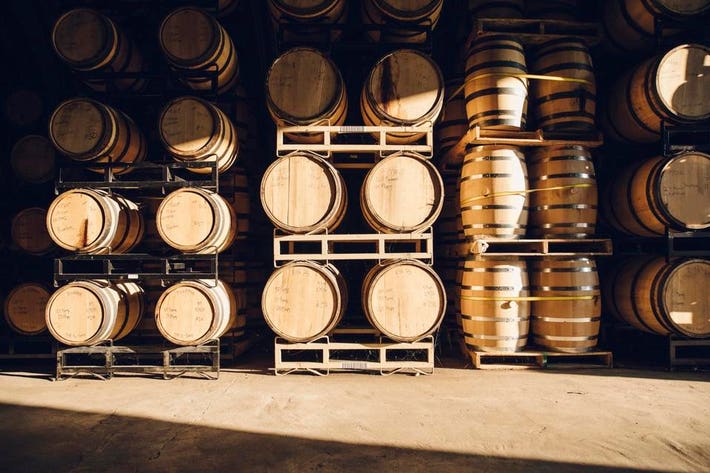Before you start your own winery, it is important to research the market, scout potential locations, develop your winery’s brand, assess your finances, and draft a business plan. Owning a winery can be profitable, but it requires careful planning and financial investment.
Starting a winery involves navigating licensing, permits, taxes, and securing financing. It is also crucial to understand alcohol laws and regulations before launching marketing campaigns for your winery.

Credit: www.inspirehub.com
Factors To Consider Before Starting A Winery
If you have a passion for wine and dreams of owning your own winery, there are several factors to consider before taking the leap. From assessing profitability to understanding the challenges involved, it’s important to thoroughly research and plan before starting your own winery. In this blog post, we will explore the key factors you should consider before embarking on this exciting venture. Let’s dive in!
Assessing Profitability
The profitability of owning a winery is a crucial factor to consider before starting your own. Conducting thorough market research to understand consumer demand and pricing trends in the wine industry is essential. Additionally, analyzing the costs involved in vineyard cultivation, winemaking equipment, storage, marketing, and distribution will help you determine the potential profitability of your winery. It is recommended to create a detailed financial projection and consider variables such as production volume, pricing strategy, and operating expenses.
Determining The Requirements
Before starting a winery, it’s important to understand and meet the legal and regulatory requirements. This includes obtaining the necessary licenses and permits for operating a winery, complying with alcohol laws and regulations, and ensuring adherence to food safety standards. It is advisable to consult with legal professionals or industry experts to ensure your winery meets all the required standards and regulations.
Understanding The Challenges
The wine industry presents its own set of unique challenges that aspiring winery owners must be prepared to face. These challenges include dealing with unpredictable weather conditions that can impact vineyard yields, the long and meticulous winemaking process, managing vineyard pests and diseases, and the constant need for quality control. It’s essential to have a comprehensive understanding of these challenges and to develop contingency plans to overcome them.
Key Steps To Starting A Winery
Starting your own winery can be an exciting and rewarding venture. However, it requires careful planning and preparation. Before you embark on this journey, there are a few key steps you need to know. These steps will help you navigate the challenges and set a strong foundation for your winery’s success.
Market Research And Scouting Locations
One of the first steps in starting a winery is conducting thorough market research and scouting potential locations. Market research will help you understand the demand for wine in your target market and identify your target audience. You need to assess the competition, understand consumer preferences, and identify any gaps in the market that you can fill.
Once you have gathered the necessary market information, you can start scouting potential locations for your winery. Look for regions with suitable climate and soil conditions for grape cultivation. Consider factors such as proximity to raw materials, accessibility, and tourism potential. Visit different vineyards, talk to local growers, and consult with experts in the industry to find the perfect location for your winery.
Developing The Winery’s Brand And Finances
Developing a strong brand is crucial for the success of your winery. A well-defined brand will help you stand out in a crowded market and attract loyal customers. Start by defining your winery’s unique selling proposition (USP) and identify your target customer. Create a compelling brand story that reflects your values, history, and winemaking philosophy.
As you develop your brand, it’s also important to assess your finances. Determine the capital required to start and sustain your winery. Consider costs such as land acquisition, vineyard development, equipment, production, marketing, and staffing. Create a detailed financial plan, including projected expenses and revenues, to ensure you have a clear understanding of the financial feasibility of your winery.
Securing Financing And Complying With Regulations
Securing financing is a critical step in starting a winery. Explore various funding options such as bank loans, investment partnerships, crowdfunding, or grants. Prepare a comprehensive business plan that includes your financial projections and outlines how you plan to use the funding to grow your winery.
In addition to financing, you need to comply with the regulations and legal requirements for starting and operating a winery. Research and understand the local, state, and federal regulations related to winemaking, licensing, permits, labeling, and tax requirements. Consult with an attorney or a winery association to ensure you are in compliance with all the necessary regulations.
Launching Marketing Campaigns
Once you have established your winery, it’s time to launch effective marketing campaigns to promote your wines and attract customers. Develop a comprehensive marketing strategy that includes both traditional and digital marketing channels. Consider tactics such as wine tasting events, partnerships with restaurants and local businesses, social media marketing, and online advertising.
Stay connected with your customers through email newsletters, wine clubs, and loyalty programs. Build relationships with distributors, retailers, and restaurants to expand your distribution network. Continuously monitor and analyze the results of your marketing efforts to refine your strategies and maximize your return on investment.
Starting a winery is a complex endeavor, but by following these key steps, you can set yourself up for success. Conduct thorough market research, scout potential locations, develop a strong brand, secure financing, comply with regulations, and launch effective marketing campaigns. With careful planning and hard work, your winery can thrive in this competitive industry.
Tips And Advice For Starting A Successful Winery
Starting your own winery can be a rewarding venture, but there are a few key things you should know before diving in. First, thoroughly research the market and scout potential locations. Next, develop your winery’s brand and assess your finances.
Finally, draft a business plan and secure financing, while also confirming alcohol laws and regulations and launching winery marketing campaigns. Follow these steps for a successful winery startup.
Utilizing Experts And The Direct-to-consumer Channel
One of the most important tips for starting a successful winery is to utilize experts in the industry and tap into the direct-to-consumer channel. Experts in winemaking, viticulture, and wine compliance can provide valuable guidance and ensure that your winery operates smoothly and in compliance with regulations. Additionally, embracing the growing opportunities in the direct-to-consumer channel can help you establish a loyal customer base and increase sales. By selling directly to consumers through your website or wine club, you have more control over pricing, promotion, and customer relationships.
Dispelling Misconceptions And Seeking Help
When starting your own winery, it’s essential to dispel common misconceptions about the industry and seek help when needed. Many people have romantic notions about winemaking and underestimate the challenges involved. By understanding the realities and seeking help from experienced professionals, you can avoid potential pitfalls and increase your chances of success. Whether it’s attending industry conferences, joining winemaking associations, or networking with fellow winemakers, building a support network will provide you with valuable resources and advice.
Creating A Business Timeline And Considering Difficulty
Another crucial aspect of starting a winery is creating a detailed business timeline and considering the difficulty of the venture. Outline major milestones such as property purchase, renovation completion, and staffing deadlines to give yourself a clear roadmap for success. It’s important to be realistic about the challenges you may face, including the hard work, dedication, and financial investment required. By understanding the timeline and difficulty involved, you can better plan and allocate resources to ensure a smooth and successful start for your winery.
Understanding The Costs And Taking Simple Steps
Before embarking on your winery journey, it’s vital to understand the costs involved and take simple steps to set yourself up for success. Starting a winery can be expensive, from land acquisition and vineyard development to equipment purchases and marketing expenses. Carefully analyze your budget and seek funding options to ensure you have enough capital to cover these costs. Additionally, taking simple steps such as studying wine business management, familiarizing yourself with alcohol laws and regulations, and leveraging technology to streamline operations can significantly contribute to the success of your winery.

Credit: schneblywinery.com

Credit: www.sttark.com
Frequently Asked Questions For 5 Things To Know Before You Start Your Own Winery
How Profitable Is Owning A Winery?
Owning a winery can be profitable, but it requires careful planning, market research, and financial investment. Starting a successful winery involves branding, securing financing, and adhering to alcohol laws and regulations. It’s important to have a solid business plan and consider factors like location and land size.
What Does It Take To Start A Winery?
To start a winery, follow these steps: 1. Research the market and scout potential locations. 2. Develop your winery’s brand and assess your finances. 3. Draft a business plan and secure financing. 4. Confirm alcohol laws and regulations. 5. Launch winery marketing campaigns.
What Do You Need To Start Your Own Wine?
To start your own winery, follow these steps: 1. Choose a name and business entity. 2. Write a business plan. 3. Navigate licensing, permits, and taxes. 4. Create a budget. 5. Secure funding for your wine business. Remember, starting a winery requires careful planning and financial investment.
How Much Land Do You Need To Start A Winery?
To start a winery, you need 5 acres of land. Find suitable land, understand the local climate and soil conditions, and choose the right grape varieties. Launch marketing campaigns and ensure compliance with alcohol laws and regulations.
Conclusion
Starting your own winery is an exciting venture that requires careful planning and consideration. From researching the market to assessing your finances, there are several important factors to keep in mind. Additionally, developing a strong brand and complying with alcohol laws and regulations are crucial for success.
Remember, owning a winery is not a cheap endeavor, but with dedication and hard work, it can be a rewarding and profitable business. So take the leap and start your winemaking journey with confidence. Cheers!


